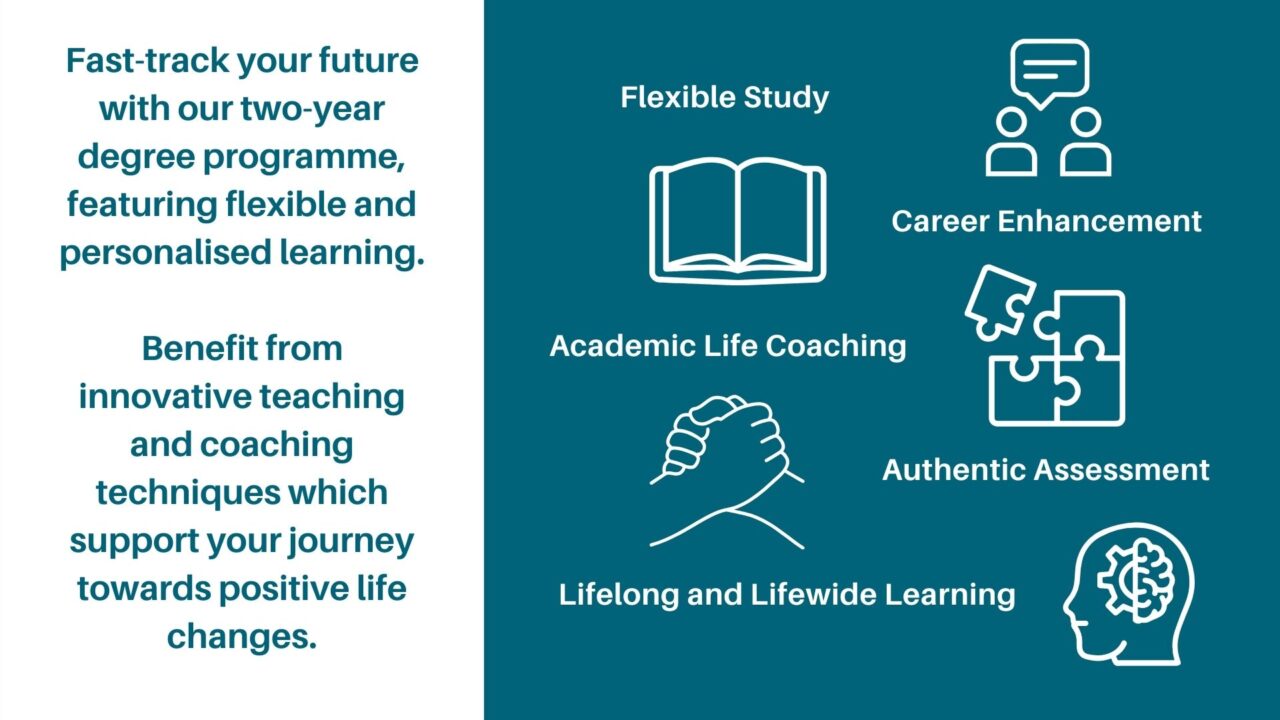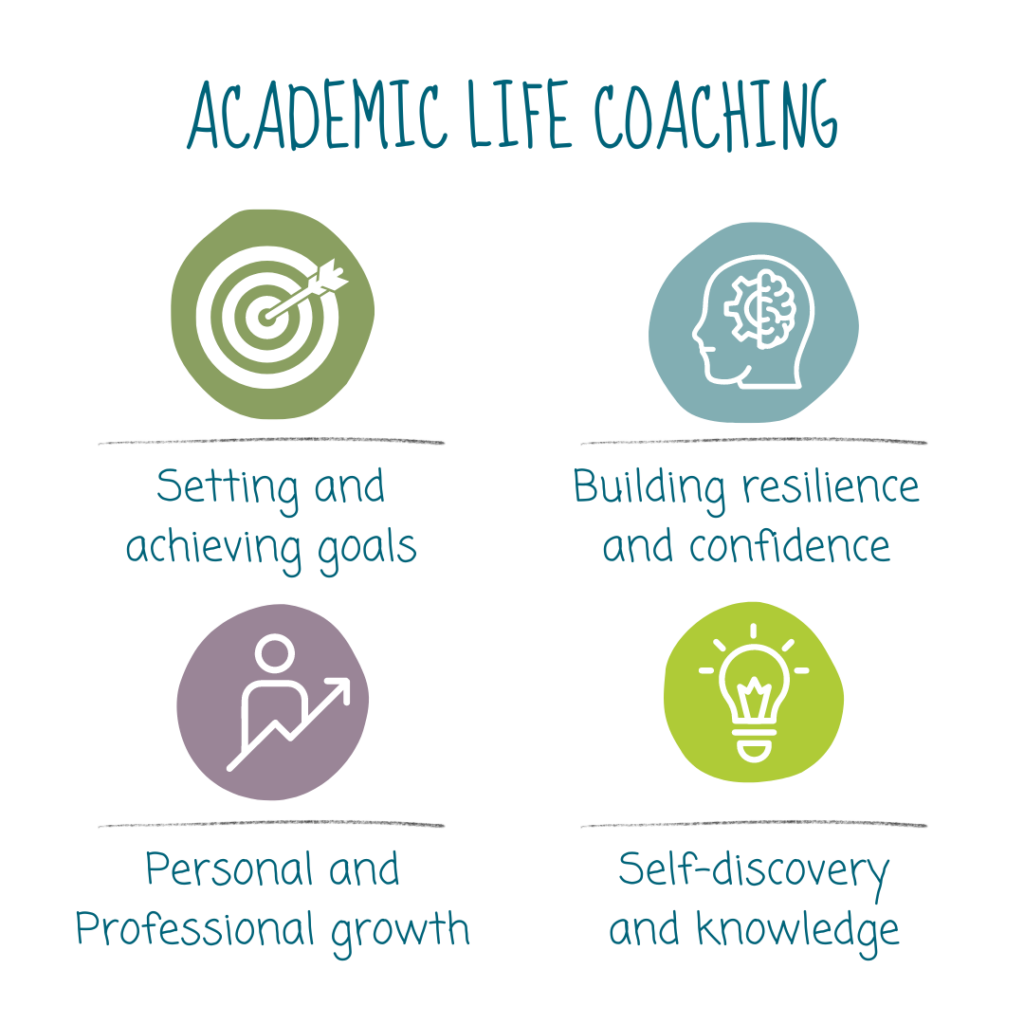-
In this module, you'll build the foundation for your future growth, both personally and professionally. You'll get chances to check out different careers, set goals, and think about your well-being. While working on your Personal Development Plan (PDP), you'll also develop important digital and information literacy skills.
-
In this module, you'll be in charge of your learning journey, creating a path that matches your strengths, interests, and goals. You'll develop habits like self-efficacy, collaboration, and networking, laying the foundation for the rest of your degree and lifelong learning.
-
This module provides opportunities to connect with professionals and peers through workshops with guest speakers from various sectors. Engage in meaningful discussions, get insights into different landscapes, and build your networks for personal and professional development.
Applied Humanities BA (Hons) Accelerated Degree
Honours Degree, Undergraduate, September 2025
Key Details
- Y002 Course Code
- 2 Years
- 96 Typical UCAS Tariff

Are you looking for a degree that’s as dynamic and unique as you are?
Applied Humanities isn’t about textbooks or exams. It’s about you!
We offer a blend of personalized coaching and group activities, designed not only to support your academic success but also to inspire you to make meaningful, positive changes in your life.
We know that you have unique talents and experiences, and our goal is to assist you in unlocking your full potential. We are dedicated to enhancing your skills and guiding you towards personal and professional success. Applied Humanities provides the platform to explore your passions and align them with your long-term aspirations.
By the time you graduate, you won’t just have a degree – you’ll have the resilience to handle setbacks, the initiative to navigate life’s changes, and the confidence to seize new opportunities.
What are you waiting for?
Unlock your potential now and book a free consultation with one of our expert academic life coaches now.
Flexible Study: Our fast-track degree is designed to fit your life, allowing you to balance studies with work and family commitments.
Career Enhancement: Build a Personal and Professional Development Portfolio (PDP) throughout the program, opening doors to exciting employment opportunities.
Academic Life Coaching: Benefit from personalised coaching sessions designed to help you identify and achieve your goals.
Authentic Assessment: Showcase your strengths with real-world projects tailored to your interests and aspirations.
Lifelong and Lifewide Learning: Embrace a continual learning approach that recognises achievements in all areas of your life.
We know that life can get busy. Applied Humanities has been designed to fit into your schedule. Campus sessions are scheduled over just two days a week with additional online material to support your learning journey. We also offer regular coaching to help you stay focused and organised with your other responsibilities.
- Focused learning with breaks
- Study one module at a time
- Academic life coaching
- Life-wide activity weeks
- Study one module at a time
- No exams – 100% Coursework
Applied Humanities is built around your interests and goals. We use innovative methods from the humanities combined with hands-on activities and supported by academic life coaching. This approach focuses on practical learning, innovation, problem-solving, and preparing you for a dynamic job market.
For more information see the module section at the bottom of the page.
In Applied Humanities, we offer a customised learning experience. This means that your assessments are negotiated on an individualised basis and centred on your personal development and progression.
Here are some inspiring examples based on the work of our current and former students:
Career Quest: Envision your future through a micro-report exploring various career paths. Uncover the skills, qualifications, and experiences needed for a lifelong learning adventure.
Success Unveiled: Craft a short video sharing your unique vision of success. Showcase how personal experiences play a vital role in lifelong learning.
Our Shared Roots: Embark on a journey through your heritage using interviews and archival images. Present them in a digital timeline, revealing the captivating stories that have shaped your identity.
Digital Fairy Tales: Reimagine classic fairy tales for the digital age. Foster digital literacy for children in an engaging and imaginative way.
Build a Business: Develop a comprehensive business portfolio and plan. Turn your dreams into reality with a grand opening at Birmingham Newman University.
Safeguarding Hub: Construct a digital resource tailored for early career teachers, including a podcast series with infographics. Provide valuable insights into the world of safeguarding.
Magazine Pilot: Write and edit the pilot edition of a digital magazine, focusing on issues that interest you. Past examples include sustainability for the plus-size market and gaming for millennials.
ADHD Explained: Create a podcast series delving into understanding ADHD. Include interviews with professionals and individuals navigating life with a recent diagnosis.
Applied Humanities gives you the flexibility and time to explore a range of future professional careers, graduate jobs, or further postgraduate training.
Some options:
- Charities and NGOs
- Civil Service
- Content Creation
- Counselling and Psychotherapy
- Design and Development
- Education
- Human Resources
- Law
- Marketing
- Media and Journalism
- NHS Leadership
- Nursing
- Police Service
- Policy
- Politics and Government
- Psychology
- Social Work
- Teaching
Entry Requirements
UK home students
Entry requirements, for UK home students, for September 2025 entry:
- 96 UCAS points
We encourage students with any educational background and work experience to enquire and apply, even if they do not meet the stated academic entry requirements. Depending on your situation and following our Contextual Admissions Policy, we may still consider your application. If you have questions about applying to Applied Humanities or want more information on entry requirements, sign up for a free consultation.
UK Applying Direct Option
International students
If you are an international student, please get in touch with our International team who will be able to advise on entry criteria for this course. Email international@newman.ac.uk or telephone +441218160449.
International Applying Direct option
To apply for this course, you can apply direct using the apply link provided below:
Please note that courses with a professional placement are not available to International students.
Course Fees
UK home students
The full-time course fee, for UK home students, for September 2025 is £11,440 per year.
International students
The full-time course fees and funding, for International students, for September 2025 are:
- Undergraduate Taught: £12,500 tuition fee
- International Excellence Scholarship: £1,500
All International Students who apply in 2024/25 will be eligible for the International Excellence Scholarship which will be automatically applied to their offer as a tuition fee reduction.
International students
For detailed information on course fees for international students, please visit our International Students page.
Additional Costs
Find out more about the other additional costs associated with our undergraduate degrees.
The University will review tuition fees and increase fees in line with any inflationary uplift as determined by the UK Government, if permitted by law or government policy, in subsequent years of your course. It is anticipated that such increases would be linked to RPI (the Retail Price Index excluding mortgage interest payments).
Please note that stated course fees are subject to final OfS (Office for Students) approval.
Modules
Applied Humanities tailors the course to your interests and goals. We blend innovative humanities methods with hands-on activities, supported by academic life coaching. This approach emphasises practical learning, innovation, and problem-solving, preparing you for the dynamic job market.
Module delivery may be subject to changes in accordance with University Regulations.
-
During this module, you will craft a powerful Professional Development Plan (PDP) where you can showcase your CVs, personal statements, and goals. This tailored plan will set you up for success when applying for exciting graduate roles or pursuing further studies and training. By the end of the module, you'll not only master the art of job applications but also possess the skills and confidence needed to excel in your future career.
-
This module lets you explore the principles and practice of interdisciplinary and interprofessional working. Expect student-led group coaching sessions focusing on peer support and assessment development. Embrace active listening, open communication, and a willingness to share responsibility and knowledge.
-
During this module, you'll design and deliver a project showcasing how you can use humanities-based approaches in real-life situations. You need to look at your project from a human-centred perspective, thinking about the ethical, social, and cultural aspects. In group coaching, you'll track your idea's progress from start to finish, improving skills like design thinking, project management, teamwork, and communication along the way.
Additional Information
Academic Life Coaching
Our coaching model is a game-changer, drawing inspiration from successful practices in the business and sports world. It’s about more than just academic success; it’s a holistic journey that fosters personal and professional growth. These sessions provide the space for you to explore, grow, and build confidence outside your comfort zone. Academic life coaches will support you on a transformative educational journey, where you take control of your learning.

General Academic Regulations: Terms and Conditions for students attending our courses
